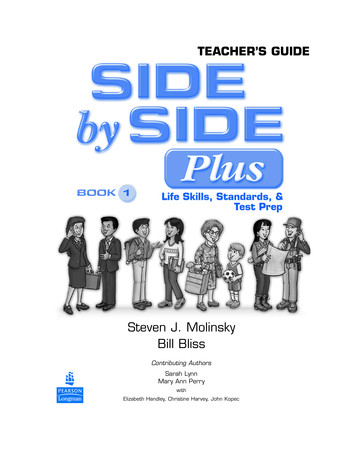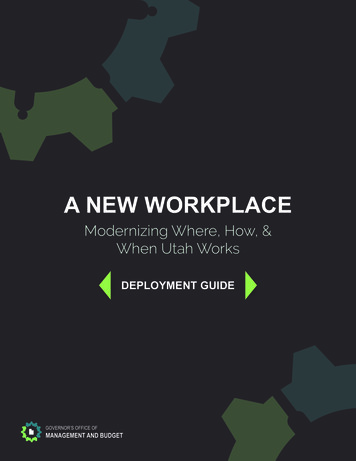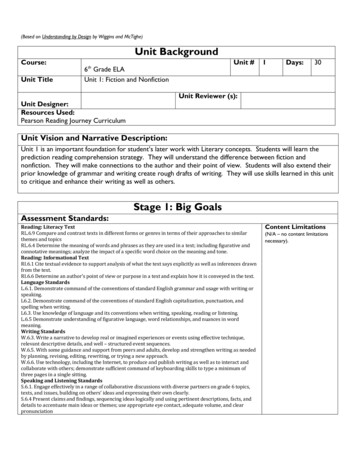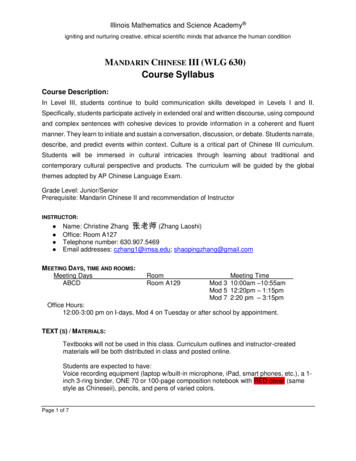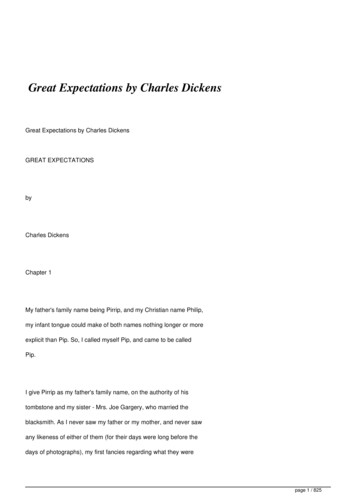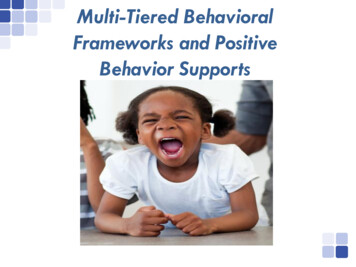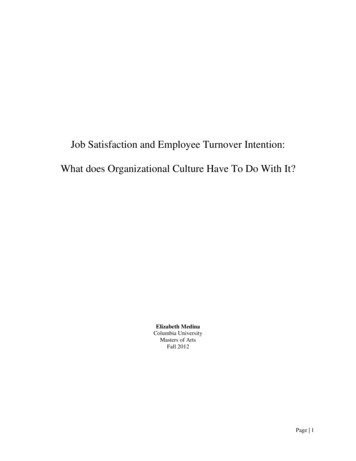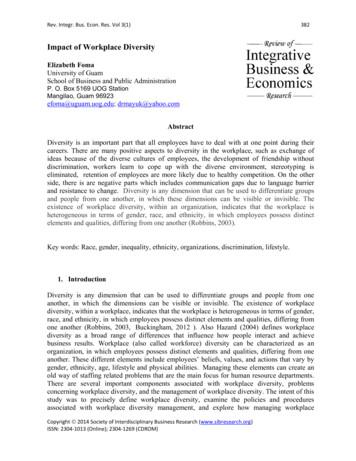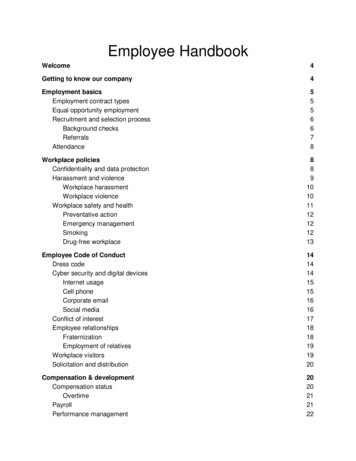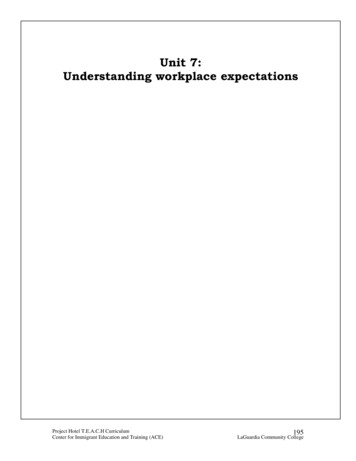
Transcription
Unit 7:Understanding workplace expectationsProject Hotel T.E.A.C.H CurriculumCenter for Immigrant Education and Training (ACE)195LaGuardia Community College
Hotel TEACH Lesson PlanUnit 7, Lesson 1AThe Language for Taking InitiativeObjective: Sts learn to politely make a suggestion.EFF Skill SetsCooperate with Others: Offer clear inputon own interests and attitudes so otherscan understand one’s actions andreactions.Industry Skill SetsTake OwnershipActivity 1:In small groups, T tells Sts that they will see four photographs ofemployees at the Grand Idea Hotel (Handout 1). Sts select a picture cardand ask each other the following questions:1) What is their job?2) What could be a problem they have with their job?3) What could be a way to fix it? (action)When Sts have finished, T asks them to talk about one of the cards.Example: In card #1 (one idea)1) They are working in the credit department2) It is difficult to move behind the counter3) Turn the desk the other way so the woman will sit on the other side of the tableand it can be easier to walk around.Activity 2T then asks Sts,What would be a good way to speak to the supervisor about the idea?How could you introduce the idea? Excuse me, would you mind if I . Is it ok if I . Would it be possible to .? Could I offer a suggestion about the .?What was the idea in this example? Turn the desk the other wayWhat is the reason for it? It is difficult to move behind the counterWhat are ways to introduce a reason? Because or soBecause current situation – it is difficult to move behind the counterSo changed future situation – it will be easier to move behind thecounter.SuggestionAction (verb)Is it if weturn the desk the other wayWould it be possibleinstall a cordless phoneProject Hotel T.E.A.C.H CurriculumCenter for Immigrant Education and Training (ACE)Reason (because orso)because it is crowdedbehind the counterso we don’t have to196LaGuardia Community College
tohave our station in thesun?T passes out Handout 2, and in pairs Sts fill out a suggestion for eachcard, using “so” or “because” for their reason.When ready, Sts role-play the situations, with one person being thesupervisor and the other the employee. Supervisors can either agreewith the suggestion or politely refuse the suggestion and offer anotheridea.theIs it OK if we turn the desk the other way, because it is too crowdedcounter?That sounds good. Go ahead.behindOrNo, we can’t do that because the computer will be too far from the outlet, butmaybe we can run cables under the rug.Extension ActivitySts notice a problem at their work or at home. Sts figure out an idea tosolve it and a way to suggest the idea to their supervisor, husband, wife,child, etc. In language lab, Sts record their idea. Then Sts exchangerecordings and listen to see if they:1) Politely introduced the suggestion2) Suggested an action3) Offered a reason using because or soProject Hotel T.E.A.C.H CurriculumCenter for Immigrant Education and Training (ACE)197LaGuardia Community College
Unit 7, Lesson 1A Handout 1Directions: Cut out and distribute four pictures to each groupCard 1Card 3Project Hotel T.E.A.C.H CurriculumCenter for Immigrant Education and Training (ACE)Card 2Card 4198LaGuardia Community College
Unit 7, Lesson 1A Handout 2SuggestionAction (verb)Reason (because or so)Is it OK if weturn the desk the other waybecause it is crowdedbehind the counter?Would it be possible toinstall a cordless phoneso we don’t have to haveour station in the sun?Project Hotel T.E.A.C.H CurriculumCenter for Immigrant Education and Training (ACE)199LaGuardia Community College
Hotel TEACH Lesson PlanUnit 7, Lesson 1BCareer Counseling: Taking InitiativeObjectiveStudents will learn the importance of taking initiative and identifyspecific examples of taking initiative at work.EFF Skill Sets addressedIndustry Skill Sets addressedPlan: Set and prioritize goals.Take Responsibility for Learning: Test outnew learning in real life applications.Take OwnershipExceed Customer ExpectationsActivity 1: Skyline HotelT hands out the handout for the Skyline Hotel (Handout 1) and explainsto Sts that they will be reading about the employees who work at theSkyline Hotel. T breaks the class up into five groups and asks them tolook for examples of taking initiative. After Sts have finished reading, Tasks the class these questions:What do you notice about the attitude of the staff at the Skyline Hotel?Write down individual responses on the board.T asks each group about one of the workers at the Skyline Hotel.(Group 1) What does Jorge do to show initiative?He communicates to his supervisor and informs him of the problem. Heoffers to fix the problem.What could have happened if Jorge had not shown initiative?Someone could have gotten hurt, and the problem could have beenworse.If you were Jorge, how would you inform your supervisor aboutthe problem and your idea to fix it?Elicit from Sts ways they would ask information from supervisor, makenote of it and review preceding “Taking Initiative” language lesson ifneeded.(Group 2) What does Alba do to show initiative?She is working on her self-improvement by taking English classes. Sheis practicing English at the job and reading the English-languagenewspaper.What is the benefit of Alba showing initiative?Project Hotel T.E.A.C.H CurriculumCenter for Immigrant Education and Training (ACE)200LaGuardia Community College
She can communicate better with her co-workers, supervisors andguests. She is improving her chances of being promoted to supervisor.(Group 3) What does Miguel do to show initiative?He calls the appropriate department to take care of the problem andtakes the responsibility to fix the problem when no one from thedepartment is available.How does the hotel benefit when Miguel shows initiative?The hotel benefits because Miguel is a team player who goes above andbeyond his job description.(Group 4) How does Irina show initiative?She initiates small talk with her supervisor.Is this a good idea or not?Yes, because she shows that she is a friendly, outgoing employee.(Group 5) What does Phil do to show initiative?He thinks of his co-workers and offers to distribute the newsletter tomake sure they get the information in it.What is the benefit of Phil showing initiative?All the hotel employees benefit because Phil is a team player who islooking out for the success of his fellow employees and, consequently,the hotel.T asks Sts the following and lists their responses on the board:“What are ways that you show initiative in your own life?” Taking this class. Fixing problems around the home. Working on homework with your children.T asks the class:“In your own words, how would you describe what it means to takeinitiative?”T writes Sts’ responses on the board, along with the following definition ifnecessary.Initiative: A new action that you take that is intended to solve a problemor create a positive result. When you take initiative, you do soindependently and without the direction of others. You do the right thingwithout being told, and accept responsibility above and beyond yourstated job.Activity 2: The Value of InitiativeT asks Sts:Is it important to take initiative at work? Why or why not?Project Hotel T.E.A.C.H CurriculumCenter for Immigrant Education and Training (ACE)201LaGuardia Community College
What are some reasons why it is important to take initiative at work? (Ifstudents have trouble thinking of reasons, preface each of thesesuggestions with “Would you ”)YouYouYouYouYouYouYouYoufeel good about the job that you are doing.are a valued employee.feel confident about yourself and the work you do.like to help others.are a good problem solver.understand the big picture of the job.are a good team player.are a good communicator.Which reason do you think is the most important for taking initiative?T reviews the EFF wheel to demonstrate Sts’ answers. T asks Sts,“Which sections of the wheel best describe taking initiative?”T then asks Sts:What are values?Values are beliefs that are important to you.Is taking initiative one of your work values? Why or why not?Is taking initiative important in your home country? Why or why not?* There may be cultural differences that discourage Sts fromtaking initiative. Review with Sts why taking initiative is animportant value/work ethic in the United States, referring to theEFF wheel, while being sensitive to their original values.T asks Sts for examples of when they took initiative in previous jobs theyheld. Review with each volunteer what was good about taking initiativeand what was not good about taking initiative. What were theconsequences of taking initiative? Also ask students what theconsequences might have been if they had not taken initiative.Activity 3: The Grandview HotelSts continue to work in their groups. T distributes Grandview Hotelhandout (Handout 2). Sts are to read the stories of workers in theGrandview Hotel and think of ways that each worker could take initiativein his/her situation. When Sts finish this assignment, T reviews eachgroup’s answers and puts their suggestions on the board.Project Hotel T.E.A.C.H CurriculumCenter for Immigrant Education and Training (ACE)202LaGuardia Community College
Homework: Preparing to Take InitiativeSts are then asked to write in their notebooks or journals three ways inwhich they can take initiative at their own job. They are also to identifysomeone who they know takes initiative and write what it is this persondoes to show initiative.Teacher TipsAs a follow-up, you can show the AHLA’s Ten-Minute Trainer Video:Segment 9 (“I’ve got a client coming!”) offers a good opportunity todiscuss how the worker could go beyond guests’ expectations andbrainstorm ways to take initiative.Project Hotel T.E.A.C.H CurriculumCenter for Immigrant Education and Training (ACE)203LaGuardia Community College
Equipped for the FutureThe 16 EFF Content StandardsThe Four Categories: Communication Skills, DecisionMaking Skills, Interpersonal Skills, Lifelong ject Hotel T.E.A.C.H CurriculumCenter for Immigrant Education and Training (ACE)204LaGuardia Community College
Unit 7, Lesson 1B Handout 1Skyline HotelWelcome to the Skyline Hotel!Jorge from engineering is in the basement, working on the airconditioning. He notices that one of the lights on the stairs is out. Whenhe has finished fixing the air conditioner, he asks his manager if he canfix the light, as he doesn’t want anyone to trip.Down the hall, Alba is on her lunch break. Alba is taking an Englishclass at her local library. She is reading a newspaper to learn newvocabulary. She is also trying to speak only English with her co-workers.One day she would like to be a supervisor of the housekeepingdepartment.Upstairs, Miguel is working as a doorman. No one is checking in or out;the lobby is empty and very quiet. Miguel is going to go outside and talkto his friend when he notices that one of the plants in the lobby has beenknocked over and there is dirt on the floor. He phones maintenance topick up the mess, but they are busy. He goes to the storage room andgets a broom to pick up the dirt himself.On the third floor, Irina has finished cleaning the guest rooms. She seesher supervisor in the hall and remembers that he just had his firstgrandchild. She says to him, “Hello, Mr. Jones! How was your weekend?Did you get to visit your grandson?” Irina and her supervisor continue tochat for the next couple of minutes.Skyline Hotel has been around for 20 years and takes pride in its staff.Management has a company newsletter that announces staffachievements and posts upcoming training opportunities. While readingthe paper on his coffee break, Phil realizes that many of his co-workersdon’t pick up the newsletter, so they miss important information. Hedecides to go to management to volunteer to distribute the newsletter tothe different departments so that more people can benefit from it.Project Hotel T.E.A.C.H CurriculumCenter for Immigrant Education and Training (ACE)205LaGuardia Community College
Unit 7, Lesson 1B Handout 2Grand View HotelWelcome to the Grand View Hotel!In the basement of the hotel, Carlos is working in the laundry room and the airconditioner is broken. The laundry room is very hot, which makes it harder to work.Carlos complains to his co-workers about the heat all day, and uses it as an excuse to sitdown when his supervisor isn’t looking.How could Carlos take more initiative in this situation?Alicia works in the lobby at the front desk, and she will be late to work because herdaughter is sick. She thinks that her co-worker James always comes early, so he will beat the front desk until she gets there. She calls her supervisor and lets her know. WhenAlicia arrives at work, her supervisor is upset because James called in sick this day andthere was no one to cover the front desk.What could Alicia have done to take more initiative in this situation?Down the hall, Maria is working in the banquet department. Maria has worked for theGrand View Hotel for several years, and would like to move up to manager. She knowsthere is a training class starting next month, but she doesn’t know how to sign up for it.She thinks, “Well, if my manager thought I was good enough, she would tell me how tosign up.”How could Maria take more initiative in this situation?Upstairs, Angara has almost finished cleaning the last guest room. As she is leaving thebathroom, she notices that some of the floor tiles are loose. She moves the garbage canon top of the tiles and leaves the room.How could Angara take more initiative in this situation?Project Hotel T.E.A.C.H CurriculumCenter for Immigrant Education and Training (ACE)206LaGuardia Community College
Hotel TEACH: The WorkplaceUnit 7, Lesson 2Working with Others: Requesting HelpObjective: To politely request assistance of co-workers and supervisorsEFF Skill SetsIndustry Skill SetsCooperate with Others: Seek input fromothers in order to understand their actionsand reactions.Follow DirectionsActivity 1T puts up four large sheets of paper on the wall, each with the followingstatements:1)2)3)4)It’s not good to ask people for help.It’s difficult to ask for help.It annoys people when others ask them for help.It makes people feel good when others ask them for help.T gives each St four Post-it notes, and Sts write “T” for “true” or “F” for“false” on their Post-its in response to each statement, and put it on thepaper. When Sts have put down their responses, T leads class in areview of the responses. Sts get into small groups to discuss thefollowing questions:1)2)3)4)What surprises you about the results from the class?Do people ask for help in your country?What are some reasons why it is good to ask for help?If you were a boss, would you want your employees to ask for help?Activity 2: Asking for and Accepting HelpT cues up the video, AHLA “Improving Communication Skills”(#05080VHS01ENGE), to 7 minutes into the tape, where the section onactive listening starts. It is a scene between a supervisor and a newengineer.Sts write down the three steps of active listening displayed on the screen:Active Listening1) Pay attention2) Understand the message3) Respond to the messageT writes the following question on the board,Does the new engineer ask for help?Project Hotel T.E.A.C.H CurriculumCenter for Immigrant Education and Training (ACE)207LaGuardia Community College
T asks Sts to watch the situation for the answer. T asks Sts to reportback their answer:No, he doesn’t. He has a confused expression on his face when his supervisorwalks into the room.T stops the tape and asks Sts:What do you think is going to happen next?T plays the tape, and then asks,What did his supervisor say? When I started fixing those air conditioners, Ineeded it explained a couple of times.Why did the supervisor say that?Was the engineer happy that the supervisor said that? How could you tell?What surprised you about this example?T asks Sts to think of questions the engineer could use in the future toask for help:Do you mind showing me this again?Could you tell me how to do this again?I think I remember how to do this, but I’m not clear about this part Finally, T asks Sts:How did the engineer show that he was listening and understood the directions?He paid attention and repeated what the supervisor said. He responded to thedirections with, “It will be up and running in half an hour.” His body languageshowed that he was confident and that he knew what he was doing now.Activity 3 – Explaining a TaskIn this activity, Sts will practice explaining a task and using clarifyingquestions to make sure they understand, and each will teach another Stthe skill.Divide class into two groups (housekeeping and banquet) and have Stssit in a circle. In housekeeping the leader is housekeeper 1 and getsHandout 1A. The rest of the housekeepers get Handout 1B. In thebanquet group, the leader is banquet server 1 and gets Handout 2A. Therest of the banquet group gets Handout 2B. The leader, who “knows howto do the task,” starts the activity. (The Sts in housekeeping learn how tomake the bed, and the Sts in banquet learn how to set the table.)Give the Sts time to study their handouts. The leaders need to think ofhow to explain the task and have the rest think of questions to ask tolearn the task. Encourage Sts to use some of the questions from Activity2.For example:Could you show me how to ?At my last job, we did it this way. Is that how I do it here?Project Hotel T.E.A.C.H CurriculumCenter for Immigrant Education and Training (ACE)208LaGuardia Community College
Sts may need to ask for clarification from their classmates and practicetheir tag questions (Unit 2, Lesson 3B). For example:First I need to strip the bed, don’t I?The wine glasses go above the knives, don’t they?When Sts are ready, housekeeper 1 and banquet server 1 start tellingtheir neighbor how to do the task; then that neighbor will tell the next,and so on around the circle until the last person tells housekeeper 1 orbanquet server 1. (The exercise is similar to a traditional telephoneactivity.) The first person tells the person sitting next to him/her and soon until the last person gets the task and needs to report to eitherhousekeeper 1 or banquet server 1. If the answers are not the same,housekeeper 1 or banquet server 1 will need to go over with the grouphow to do the task.MaterialsFour sheets of newsprint to put on wall, video from AHLA“Improving Communication Skills” (#05080VHS01ENGE) set at 7minutes into the tape.Teacher TipsThe activities are from OTAN Housekeeping Curriculum and SheratonBanquet setup instructions.Project Hotel T.E.A.C.H CurriculumCenter for Immigrant Education and Training (ACE)209LaGuardia Community College
Unit 7, Lesson 2 Handout 1AHousekeeper #1 – Knows How to Make the BedProject Hotel T.E.A.C.H CurriculumCenter for Immigrant Education and Training (ACE)210LaGuardia Community College
Unit 7, Lesson 1 Handout 1BNew Housekeeping Employee – Learn How to Make the BedDirections: Ask your partner how to make the bed because your paper is not in thecorrect order. You will want to know what steps 1, 2, 3, etc., are. Also, take notes onwhat you need to do at each step.Project Hotel T.E.A.C.H CurriculumCenter for Immigrant Education and Training (ACE)211LaGuardia Community College
Unit 7, Lesson 2 Handout 2ABanquet Server #1 – Knows How to Set the TableProject Hotel T.E.A.C.H CurriculumCenter for Immigrant Education and Training (ACE)212LaGuardia Community College
Unit 7, Lesson 2 Handout 2BNew Banquet Employee – Learn How to Set the TableDirections: Your guest, Greta Garbo, wants to sit alone, but your table is not set. Askyour partner where to put the items listed at the bottom of the page, and draw them onyour table.What you need for your table:Napkinwater glasswine glassdinnerknifeteaspoonsalt &peppershakersProject Hotel T.E.A.C.H CurriculumCenter for Immigrant Education and Training (ACE)salad forkdinner forkbread &butter knifebutter plate213LaGuardia Community College
Hotel TEACH Lesson PlanUnit 7, Lesson 3Career Counseling: Keeping a Professional Demeanor/Defensiveness& CriticismObjectives:Sts will learn the impact of defensive behavior and identify ways tomanage feelings of defensiveness. Sts will also learn appropriate ways togive and receive criticism.EFF Skill Sets addressedIndustry Skill Sets addressedResolve Conflicts and Negotiate: Identifyareas of agreement and disagreement.Listen Actively: Clarify purpose for listeningand use listening strategies appropriate for thatpurpose.Act with Professionalism & IntegrityActivity 1: Defensive BehaviorT explains to the Sts that they will be watching a video clip fromAmerican Hotel and Lodging Educational Institute’s “PerformanceAppraisal and Coaching” (Section 14:16-15:51). This is a video that isused to instruct hotel managers on how to train their employees so theycan provide improved customer service.The clip that will be shown is a scene between a manager and anemployee, who are having a meeting to discuss the employee’sperformance.After T shows video segment, elicit discussion with the followingquestions:What happened in this video?How was the employee’s response to what was being said?How was the employee’s attitude? Body language?What do you think about the employee’s behavior?As Sts respond, T writes their answers, along with the following, on theboard:A defensive response is when someone is trying to protect him- orherself by making excuses for behavior.T asks Sts for examples from their lives of people being defensive.How does it make you feel when someone gets defensive?How does it feel when you become defensive?Project Hotel T.E.A.C.H CurriculumCenter for Immigrant Education and Training (ACE)214LaGuardia Community College
T asks Sts: When do people get defensive?someone disagrees with themsomeone criticizes themsomeone brings up a problem that they have causedsomeone feels guilty or knows that he/she is wrongWhat usually happens when someone gets defensive?Listening stops on both ends of the conversation.People usually respond with defensiveness.An argument can happen.You don’t hear the valuable information in the criticism foryou to improve your job. You can lose trust of an employer or co-worker.T asks Sts:How can being defensive get in the way of your job? It creates an uncomfortable work environment. It creates tension. You don’t hear the valuable information in the criticism for youto improve your job. You may continue doing your job in the wrong way and putyourself at risk for losing your job.T replays the video and asks Sts to focus on the behavior of the manager.How does the manager respond to the employee’s defensive behavior?SheSheSheSheremains calm.allows the employee to vent.acknowledges his feelings.asks clarifying questions to understand his perspective.Activity 2: CriticismT elicits from Sts the good and bad aspects of criticism and writes theirresponses on the board in separate columns.For example:BadGood-Can learn about your mistakes-It does not feel good to be-Can do a better jobcriticized-Opportunity to show improvement - Can feel embarrassed-Can be motivating- Can feel angry-Can be constructiveT asks Sts the following:Project Hotel T.E.A.C.H CurriculumCenter for Immigrant Education and Training (ACE)215LaGuardia Community College
Why is criticism important at the workplace? Who usually gives criticism?Sample answers: When you work with other people, you give andreceive feedback. Sometimes your employers may need to pointout problems with your job performance. In other situations, youmay have to give criticism to co-workers and managers.T then asks Sts:What does the term “constructive criticism” mean? What is the goal of constructivecriticism?Constructive criticism is criticism given in a positive way, sothat the person hearing the criticism will benefit andperformance will improve.T then distributes Handout 1, “Criticism Guidelines,” and reviews eachpoint with class. Elicit from Sts what each point means to them. AskSts if there is anything that they would like to add on how to giveconstructive criticism or on how to receive criticism in a constructiveway.Activity 3: Role PlayAsk the class for three volunteers to perform a role play in front of thegroup: hotel worker 1, hotel worker 2 and hotel worker 3Distribute the role-play situation cards and instruct the class to act outthe directions on the card.Hotel worker 1 and hotel worker 2 are to perform the role play first.After their role play is performed, review the experience with the class.Use the following questions to elicit discussion.Ask the St who played hotel worker 1 about the experience. Howdid he/she feel about the criticism? How did he/she feel likereacting? What was he/she thinking?Ask the class if anyone has been in a situation like this before?What happened? How did he/she react? Did the way he/shereceived criticism make a difference in his/her behavior?Then ask hotel worker 1 to perform the roleplay with hotel worker 2.Ask the St who played hotel worker 1 what was different about theexperience. How did he/she feel about the criticism? How didhe/she feel like reacting? What was he/she thinking? Ask theProject Hotel T.E.A.C.H CurriculumCenter for Immigrant Education and Training (ACE)216LaGuardia Community College
class for any observations they have about the difference betweenthe two role plays.Journal ExerciseGive Sts the self-reflection questionnaire, and have them answer thefollowing questions in their journals when they complete thequestionnaires. What did you learn about yourself? What would youlike to change about your experience of criticism? What can you do tochange?Give Sts the following questions to reflect on in their journal:One of the suggestions on how to handle criticism is to take time to thinkabout it. In your own words, what should you do in this quiet time?If someone criticizes you, whom could you confide in and tell about thecriticism?Project Hotel T.E.A.C.H CurriculumCenter for Immigrant Education and Training (ACE)217LaGuardia Community College
Unit 7, Lesson 3 Handout 1Guidelines for Giving Constructive Criticism Give criticism in private.Do not sound threatening.Focus on the problem, not on the person’s personality.Don’t overstate the problem by using words such as “always,” “never”or “worst.”Don’t blame.Don’t wait too long. Give criticism soon after the event.Stick to one subject. Don’t string together many criticisms at onesitting.Don’t remind people of past instances that have been resolved.Use “I” messages. Example: “I feel overwhelmed when you don’t dothe work you are responsible for because I have to do extra work.”Guidelines for Receiving Criticism If you feel upset or angered by criticism, try not to respondimmediately. Take a deep breath and remain calm. Don’t take it personally. You are being criticized for something youdid, not for who you are. View the criticism as an attempt to fix a problem, not a personalattack. Maintain eye contact and open body language as you listen. Don’t get defensive. Use active listening. Ask for time to think about it. Decide what you can learn from the criticism. Talk it over with a friend or counselor. Figure out what you are going to say before you respond to thecriticism.Project Hotel T.E.A.C.H CurriculumCenter for Immigrant Education and Training (ACE)218LaGuardia Community College
Unit 7, Lesson 3 Handout 2Role-Play CardsRole play: Hotel Worker 1You are a room service attendant at the Grandview Hotel.A guest of the hotel has made a complaint to the manager about the appearance ofher room. She said that the bathroom was not clean. There was hair in the tub,and she did not find any replacement soaps or shampoos. She also complainedthat there was trash on the floor that should have been picked up.You are the worker who was responsible for that room. Listen to what your coworker has to say about your performance. Listen to the criticism, and practice theguidelines for handling criticism.Role play: Hotel Worker 2A guest of the hotel has made a complaint about the appearance of her room. Shesaid that the bathroom was not clean. There was hair in the tub, and she did notfind any replacement soaps or shampoos. She also complained that there wastrash on the floor that should have been picked up.You work with the person who was responsible for cleaning that room. This is notthe first time that you have heard a complaint about this person. You arefrustrated. His/her performance is slowing you down, and you feel you are doingmore than your share of work. Criticize this person in a negative way.Role play: Hotel Worker 3A guest of the hotel has made a complaint about the appearance of her room. Shesaid that the bathroom was not clean. There was hair in the tub, and she did notfind any replacement soaps or shampoos. She also complained that there wastrash on the floor that should have been picked up.You work with the person who was responsible for cleaning that room. This is notthe first time that you have heard a complaint about this person. Give this personconstructive criticism.Project Hotel T.E.A.C.H CurriculumCenter for Immigrant Education and Training (ACE)219LaGuardia Community College
Unit 7, Lesson 3 Handout 3Self-Reflection QuestionnaireRead the following, and give yourself a number that best describes you:(1 Yes; 2 No; 3 Sometimes)When I am wrong, I am not afraid to admit it.I become defensive when I am being criticized.When I am angry and someone asks if I am, I admit it.People tell me I raise my voice, even though I am not aware of it.When I make a criticism, I make sure to refer to the person’s actions and behavior.For example, I would say, “I disagree with the way you handle our child,” ratherthan, “You are a bad parent.”Journal Exercise: What did you learn about y
Center for Immigrant Education and Training (ACE) LaGuardia Community College 200 Hotel TEACH Lesson Plan Unit 7, Lesson 1B Career Counseling: Taking Initiative Objective Students will learn the importance of taking initiative and identify specific examples of taking initiative at work. EFF Skill Sets addressed Plan: Set and prioritize goals.

